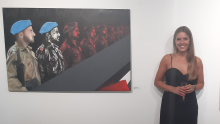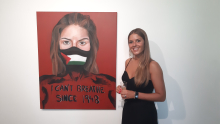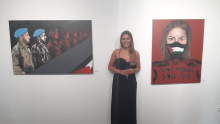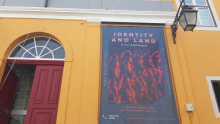Rita Andrade inaugurates painting exhibition on Palestine
The exhibition "Identity & Land," in which painter and activist Rita Andrade shows some of the works she produced as a result of her experience on a trip to Palestine in 2019, opened yesterday, 8 August, at the Gallery of the Faculty of Fine Arts of the University of Lisbon.
Expressing herself through painting, which she considers "a peaceful form of communication," Rita Andrade makes clear her defence of Palestinian rights and her protest against Israel's illegal occupation of Palestine.
In a video made available on her website in preparation for the 2021 presentation of her exhibition "I Can't Breathe Since 1948," Rita tells us how she was inspired by Roger Waters to deepen her understanding of the Palestinian question, how this led her to travel to Palestine to experience the effects of the occupation on the ground, and how this has influenced her artistic production.
"Art is a non-violent way of expressing myself, spreading a message and making an intervention. I believe that art can play an important role in social transformation, and I hope I can do just that," confesses Rita Andrade.
The exhibition, inaugurated yesterday, will be open until 26 August, from Monday to Friday, between 10h00 and 17h00, and on Saturdays between 10h00 and 15h00.
The exhibition's curator, Carlos Vidal, wrote the following contextualising text:
NIGHTFALL IN GAZA
Paul Veyne says that history is a novel, it can be "creative" in its versions, but it is a realistic novel, he warns. For example, in the case of the Arab-Israeli conflict or war of occupation, which the Zionists call, or called (in the 1940s), the "war of independence," the equidistant position is the worst and most inhumane. In fact, since 1948, the year of Israel's declaration of independence (a "declaration," it should be noted, unrelated to any kind of emancipatory struggle), there has been and still is an illegal occupation in Palestine (Israel and the destructive brutality that would generate the "settlements," systematically condemned by the UN), an occupation based on a lie which says that a state has been built which is a land without a people for a people without a land. A land without a people?
This is where the projected genocide and apartheid begin: in effect, Israeli Arabs are what Agamben might call "naked lives", because Israel is not a multinational state when it claims to be the Jewish homeland. In these terms, defending Palestinian rights signals two facts: it shows that denouncing Israel should serve to distinguish anti-Zionism (and it was Zionism that destroyed the King David Hotel in 1946) from anti-Semitism (an abject form of racism); on the other hand, defending the Palestinians is defending a people who have inhabited a land for millennia and lost it (the Nakba): the land, the communication routes, the cities (there are new cities in the settlements, but these are inaccessible), and the olive tree that the woman in the white scarf hugs, in one of the paintings in the exhibition, because she knows she has lost her source of livelihood. Rita Andrade, who has a master's degree from Goldsmiths in Art and Politics, has known this reality, lived it, and knows what apartheid is like in Palestine, which has resisted since 1948.
Note that saying "Jewish state" (and not "citizens' state," as in Europe since the Enlightenment) is an anti-democratic statement. That's why Edward Said always advocated a single binational state for Palestine, something like today's multicultural South Africa. Without settlements or bantustans. A distant world, however.
Carlos Vidal





